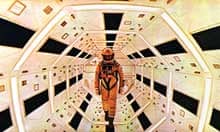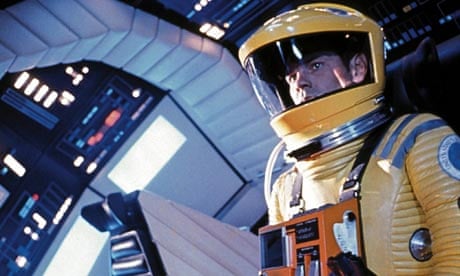Stanley Kubrick's 1968 sci-fi masterpiece 2001: A Space Odyssey is, for me, primarily about the experience of total awe. Yes, you can spend an entire evolutionary stage debating the meaning of the interstellar monolith, or whether or not the film is really an elaborate triple allegory involving Nietzsche and Homer. That's all fun, but it's kind of missing the point. When I watched 2001 for the first time (on TV late one night, by accident, when I was 12 or 13 and my parents were downstairs throwing a party), I didn't have a clue what was going on. I wasn't even planning to watch the film, which I knew was long and slow and probably boring. But then it came on, and 20 minutes of ape-men hitting each other with bones gave way to a sublime extraterrestrial waltz, and I forgot about changing the channel.
It didn't matter that I understood little or nothing at all. I was mesmerised and, probably for the first time, happy to commit to a film that didn't have a conventional plot to carry me through. The scene that reverberated in my head for months afterwards was the slow approach to the rotating space station off Earth, exhilaratingly set to The Blue Danube. But there was also the spectacle of watching a space hostess defying gravity in a tubular corridor, and the claustrophobic scenes involving HAL, and that whole final sequence – from time-warp to neo-classical apartment to planet-sized star child – which dealt with any fuses left unblown in my early-teenage brain.

It was the perfect age at which to watch it. My childlike sense of wonder was still reasonably intact and I was yet to develop a neurosis about not being able to understand every underlying meaning in a work of art. In a way the film defies intellectual engagement. Kubrick himself called it "basically a visual, nonverbal experience … which hits the viewer at an inner level of consciousness, just as music does, or painting". The plot summary he gave to Joseph Gelmis in 1970 drily proves his point.
When I watched 2001 again a few months ago, what I loved about it was the insane hubristic ambition. Not only does it trace humanity from "The Dawn of Man" to the space age and beyond, blinking out thousands of years of painstaking evolution in a single edit: it also deals with the limits of human understanding and attempts to represent states of existence that lie outside those limits.

Kubrick is regularly criticised for his cold view of humanity, and nowhere is that more explicitly in evidence than here. Perhaps it makes this an odd choice of favourite film, and I certainly don't disagree with the criticism – the human performances in 2001 are some of the most featureless in cinema history – but that's not to say Kubrick couldn't do emotion.
Ironically, the most affecting moment in the film involves a dying machine. To prevent HAL from destroying him, the nondescript protagonist Bowman (Keir Dullea) crawls into the computer's central core and unscrews its modules one by one. HAL asks him not to. "Dave, stop. Stop, will you. Stop Dave. Will you stop, Dave?" Returning to a childlike state, HAL sings Daisy Bell, the first song it learned after becoming operational, and its sinisterly calm voice slurs to a standstill. It's one of the most brilliantly unsettling death scenes in the movies.
I was worried, when I watched 2001 again for the first time in 17 years, and a decade on from the year of its projected future, that it would seem dated and that I'd be more frustrated by it than wowed. But the sense of wonder remained thrillingly intact (even though I did spend ages afterwards trying to figure out what it all meant). Kubrick's grand vision still inspires total awe today.

Comments (…)
Sign in or create your Guardian account to join the discussion